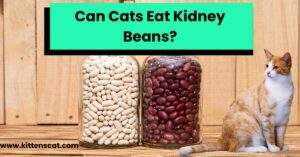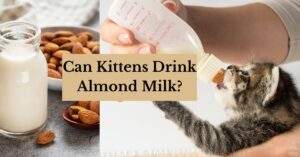Do you know feline friends have a low carbohydrate demand? But they have a high protein demand and require highly particular nutrients that they cannot produce themselves from the food they eat. Although some of the nutritional value of beans, like as the high protein and fiber content, may suit them well, cats have a hard time digesting plant material and legumes. So they won’t receive the full advantages of eating them.
Beans and rice are popular dishes in many cultures around the world. Beans provide protein, fiber, and minerals, while rice provides carbs and micro-nutrients. You may be wondering if beans and rice are okay for your cat to consume if you want to mix up their diet. So, are you curious about whether or not cats eat beans and rice?
Can Cats Eat Beans And Rice?
Yes, cats can eat beans and rice. Beans and rice are great sources of protein and nutrients for feline friends. Cats require animal protein to thrive. However, this doesn’t mean they can’t eat plant-based foods like beans and rice. Many commercially-prepared cat foods contain small amounts of these ingredients.
As long as the rice and beans dish is cooked properly without certain spices or other elements, cat should be able to eat it. If you’re unsure whether your cat can eat beans and rice, it’s best to ask your veterinarian for advice.
How to Introduce Beans And Rice To Cats?
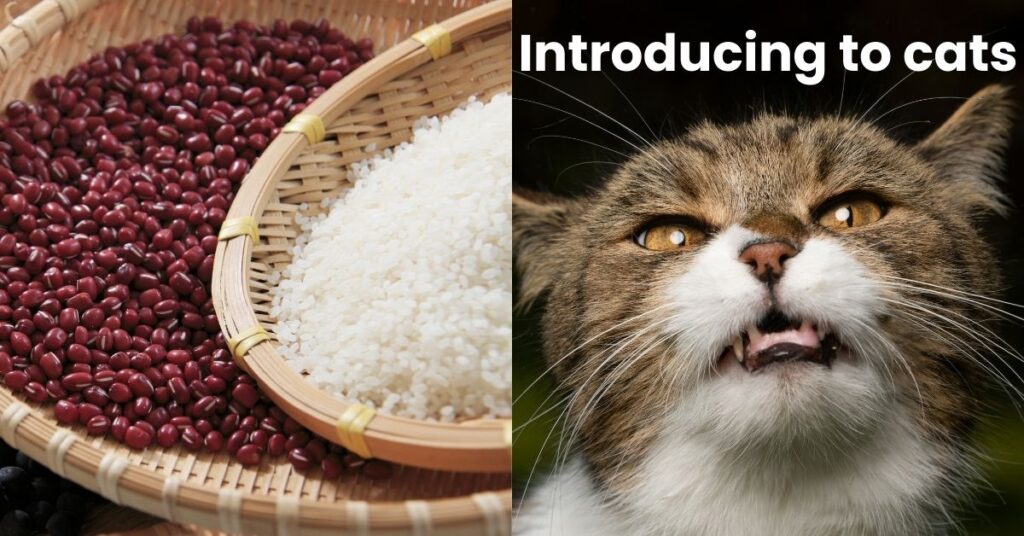
- One way to introduce beans and rice to your pet is to start by mixing a small amount of each into their regular food.
- Once they seem okay with that, you can gradually increase the proportions of beans and rice until they eat mostly beans and rice.
- Another option is to make a separate dish of beans and rice for your cat.
- Some people like to add a little bit of chicken or other meat to this dish to make it more appealing to their feline paws.
Steps To Feed Beans And Rice To Cats:
If you’re interested in feeding your cat beans and rice, there are a few things to keep in mind.
- First, cook the beans and rice thoroughly before giving them to your cat. Beans can be toxic to feline companions if they’re not cooked properly.
- You can cook or purchase precooked beans and rice from the grocery store.
- If cooking the beans and rice yourself, drain and rinse them before feeding them to your cat.
- Second, don’t give your cat more than a small number of beans and rice at a time. This may cause weight gain if your cat eats too much of them.
- Finally, offer your cat plenty of fresh water to drink when it’s eating beans and rice. This will help her stay hydrated and prevent constipation.
Pros And Cons Of Feeding Beans And Rice To Cats:
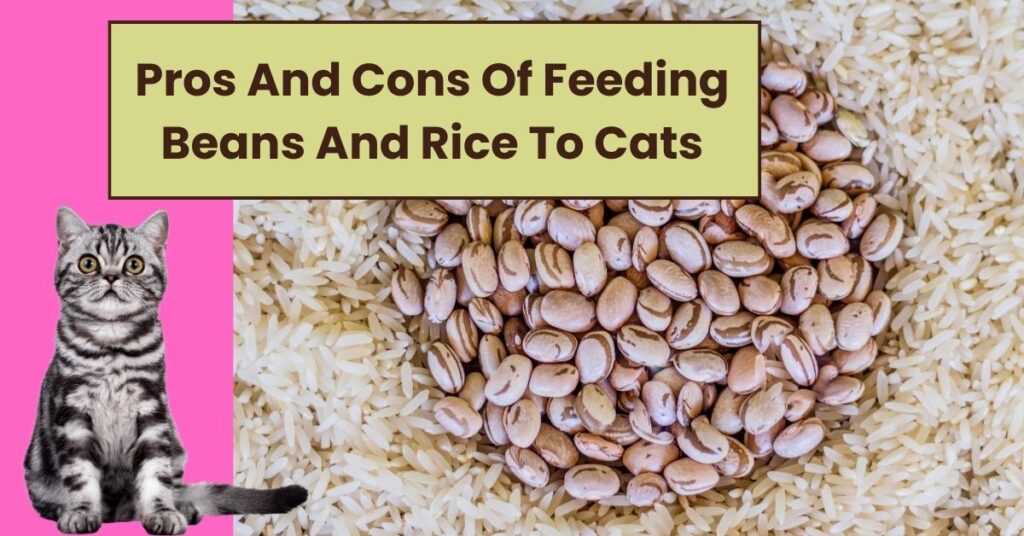
Pros:
- The pros of feeding beans and rice to feline companions include that they are a good source of protein and fiber.
- They’re also easy to digest and provide essential nutrients that feline friends need.
- Beans and rice can also help to regulate a cat’s blood sugar levels.
Cons:
- On the con side, some beans and rice contain toxins that can harm cat.
- And, if not cooked properly, beans and rice can cause intestinal blockages in cats.
- The cons of feeding beans and rice to cats include that they may cause gas and bloat.
- Beans and rice may also contain phytic acid, which can reduce the absorption of minerals in a cat’s body.
What types of rice can cats eat?
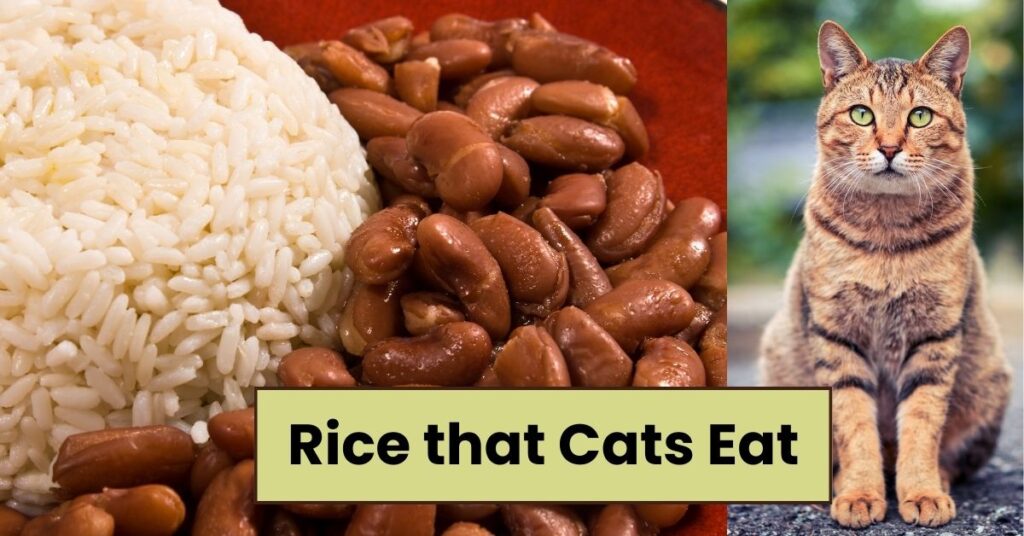
There is an abundance of unique varieties of rice. As long as it is properly prepared, feline companions will eat it (without salt, oil, butter, or seasoning). Some varieties of rice that can excite your interest are as follows:
The brown rice:
Brown rice is safe for cats to consume, but they may have trouble digesting it due to the bran coating.
White Rice/boiled rice:
As the harsher components of the rice have been eliminated during the cooking process, cats can eat boiled rice without any digestive issues.
Rice Cake:
I assume you stock your pantry with rice cakes. Don’t bother bringing them out just so your cat may pounce on them. Rice cakes aren’t anything a cat would ever consider a treat. Instead, spoil your cat with a treat developed only for felines.
Fried Rice:
Don’t give your cat fried rice. Onions in the recipe are toxic to canine and feline red blood cells.
Do Cats Get Sick From Eating Beans and Rice?
The short answer is no; beans and rice are not bad for cats. However, you should keep a few things in mind if you’re considering feeding your cat these foods.
- Avoid feeding beans and rice to cats with sensitive stomachs.
- Beans and grains are carbohydrate-rich. Cats don’t need carbohydrates as humans do.
- Too many carbohydrates can cause cats to gain weight, so provide them with protein-rich food.
- If you give your cat beans and rice, cook them well.
- Raw beans and grains can induce vomiting and intestinal obstructions in cats.
Conclusion:
After all, we want to ensure our furry friends get the nutrients they need to stay healthy. When it comes to beans and rice, the answer is a little bit complicated. Cats can technically eat both beans and rice. If you’re still unclear about whether beans and rice are healthy for your cat, it’s best to set up a visit to your veterinarian.
FAQ’s
How about beans and rice? Do they have any side effects that might be harmful to cats?
Some people say beans and rice are fine for cats, while others say they can be harmful. It is generally agreed that moderation is key. Beans and rice can be a healthy part of a cat’s diet, but they should not be the only thing a cat eats. To prevent stomach upset, be sure to boil beans and rice completely before giving them to your cat.
I want to know if my cats are allergic to beans and rice?
No, cats are not allergic to beans and rice. However, some cats may be sensitive to certain ingredients in these foods. If your cat has any adverse reaction after eating beans or rice, please consult your veterinarian.
How much rice can a cat eat?
How Much Rice Can Cats Safely Eat? Cats shouldn’t eat rice too often since its high carb content might cause digestive issues, including diarrhea, bloating, and gas. Table scraps don’t have a specific measurement, but a few nibbles won’t hurt.


